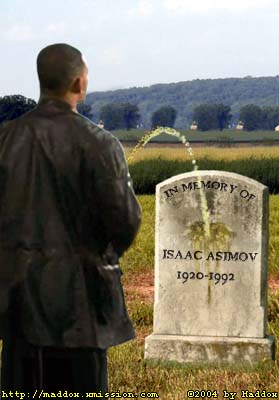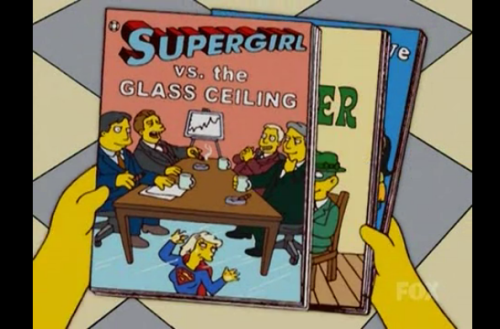 |
| Figure one |
I've just finished I, Robot for the second time in my life and the vindication I feel for picking it back up is one part nostalgia, one part, mommy wow--I'm a big kid now...and two more parts the-math-necessary-to-complete-the-pie.
 |
| Merci, Norman |
Color me smug as fuck.
Most people are familiar with the three laws of robotics:
The reader in fact learns them at the onset. The book itself is a collection of short stories which present stand-out cases in robot psychology looked back upon at the twilight of a note-worthy career. Easily one of the best framing stories I've encountered.
It's a trick I've seen done well two other occasions in the Angle of Repose and the Commissar Cain series. As a concept it's what you'd expect--interviewer/narrator high jacking the 3d person perspective from time to time to feed us background and other tidbits not arrived at through the primary source who is in this amalgamation, the female protagonist, Dr. Susan Calvin.
Now Susan is an amazing woman who is seventy-five years wise and a little incredulous that this interview is worthy of her time. We find out in the the introduction that she was born in 1982, the same year as I and also the same year US Robotics, the enterprise Susan works for, was formed.
Back at the tender age of barely 14-- if I noted the year of her birth at all--I likely just thought it normal that a successful women at the top of her field in experimental robopsychology would be born 32 years after 1950, when the book was first published. But Asimov had no reason to think that.
 |
| And honestly, neither did I. |
"She was a frosty girl, plain and colorless who protected herself against a world she disliked by a mask-like expression and a hypertrophy of intellect."A lot of fun, that Sue.
Or how about this repartie between two of her colleagues:
"She's qualified isn't she?" demanded the general with a sudden frown of uneasiness. "Yes." Bogart seemed amused. "She's qualified alright. She understands robots like a sister--comes from hating humans so much, I think. It's just that psychologist or not she's an extreme neurotic. Has paranoid tendencies. Don't take her too seriously."Yeah, she was a bit annoyed about robots without serial numbers being modified to bend the First Law. Don't mind her...bitches be crazy.
In the end of that tale she ends up being in complete control of the situation and right on all accounts. When drawn in contrast to the only other adult woman in the book--a person nothing more than frivolous and cruel-- Susan looks every bit the genius that she is. It is because of this that I don't think Asimov was intending to show her in a sexist light. I think this is more a reflection of his supposition that to be a succeful woman in a white man's world, one must embody the more unsympathetic aspects of what is commonly considered masculine.
 |
| Right back at you, Madam Secretary |
But let's give this man his cred, he invented the term robotics and beyond that writes prose like a pro.
Indulge me in just two more direct quotes:
"It was one of Gregory Powell's favorite platitudes that nothing was ever gained from excitement, so when Mike Donovan came leaping down the stairs towards him, red hair matted with perspiration, Powell frowned."Mike and Gregory are field agents who do wonderful things with testing the laws of robotics in the wild. Or as they say in French, sur le tas.
"Kallner, with his baldness glistening, and his dress uniform oddly unsuited for the general mood, began with uneasy directness."And remember, although this is fiction and we as a planet are not where he projected we would be at this point in human history, Asimov's pronouncements as to the way robots and AI will have to work to keep us humans safe are held up as the standard expectation for future developments.
For example, a team of researchers are currently working with a robot in Slovenia to determine a functional pain threshold in humans, in the hopes of building robots who can better adhere to the first law.
As New Scientist's points out, this is a stark violation of Asimov’s first law of robotics, but the scientists behind the study say the point of the study is to better define that rule. After all, how can a robot be expected not to adhere to the law (“a robot may not injure a human being”) if it doesn’t first know the boundary between harmful and harmless? ARTICLE IN FULL.I think we can agree that these points of data make a beautiful line. I recommend this book not just as a cultural touch-stone but also as a damn fine piece of literature. Plus, robots!
Can't get enough of AI? Check out my drunken conversation with Cleverbot.
But look at me still talking when there's science to do. See you when you run out cake!
You have read this article Asimov /
Hillary Clinton /
Home Alone /
I robot /
I too am moist /
Nicolas Cage /
Norman fait des vidéos /
Portal /
Still Alive /
Super Girl /
The Simpsons /
Will Smith
with the title la vitesse de la lumière. You can bookmark this page URL http://trendcelebrity2014.blogspot.com/2012/07/la-vitesse-de-la-lumiere.html. Thanks!



.jpg)


No comment for "la vitesse de la lumière"
Post a Comment